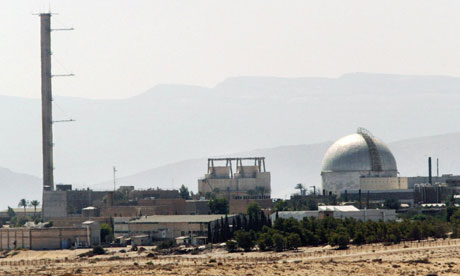Israel's nuclear capability and policy of strategic ambiguity
Formally, Israel says it will not be the first country to introduce nuclear weapons in the Middle East

The nuclear plant at Dimona, in the Negev desert, was built for civilian use. Photograph: Thomas Coex/AFP/Getty Images
Israel is an undeclared nuclear power: it has a nuclear plant in the southern city of Dimona, in the Negev desert, and is believed to have a formidable nuclear arsenal, but the government has always maintained a policy of "strategic ambiguity". Israel – like India, Pakistan and North Korea – is not a signatory to the Nuclear Non-Proliferation Treaty.
The main atomic reactor in Dimona, officially for civilian use, was built with French help and became operational in the early 1960s.
Within a few years the CIA concluded Israel was producing nuclear weapons at the plant, but it was not until 1986, when Mordechai Vanunu, a technician at Dimona, spoke to the Sunday Times that the extent of Israel's nuclear arsenal became clear.
Four years ago Israel's then prime minister, Ehud Olmert, accidentally acknowledged Israel's nuclear capability when he told German television: "Iran, openly, explicitly and publicly, threatens to wipe Israel off the map. Can you say that this is the same level, when they are aspiring to have nuclear weapons, as America, France, Israel and Russia?" Formally, Israel says it will not be the first country to introduce nuclear weapons in the Middle East and has led calls for a hardline policy to curb Iran's nuclear ambitions. The current prime minister, Binyamin Netanyahu, has said a nuclear-armed Iran is the greatest security threat facing his country.



No comments:
Post a Comment